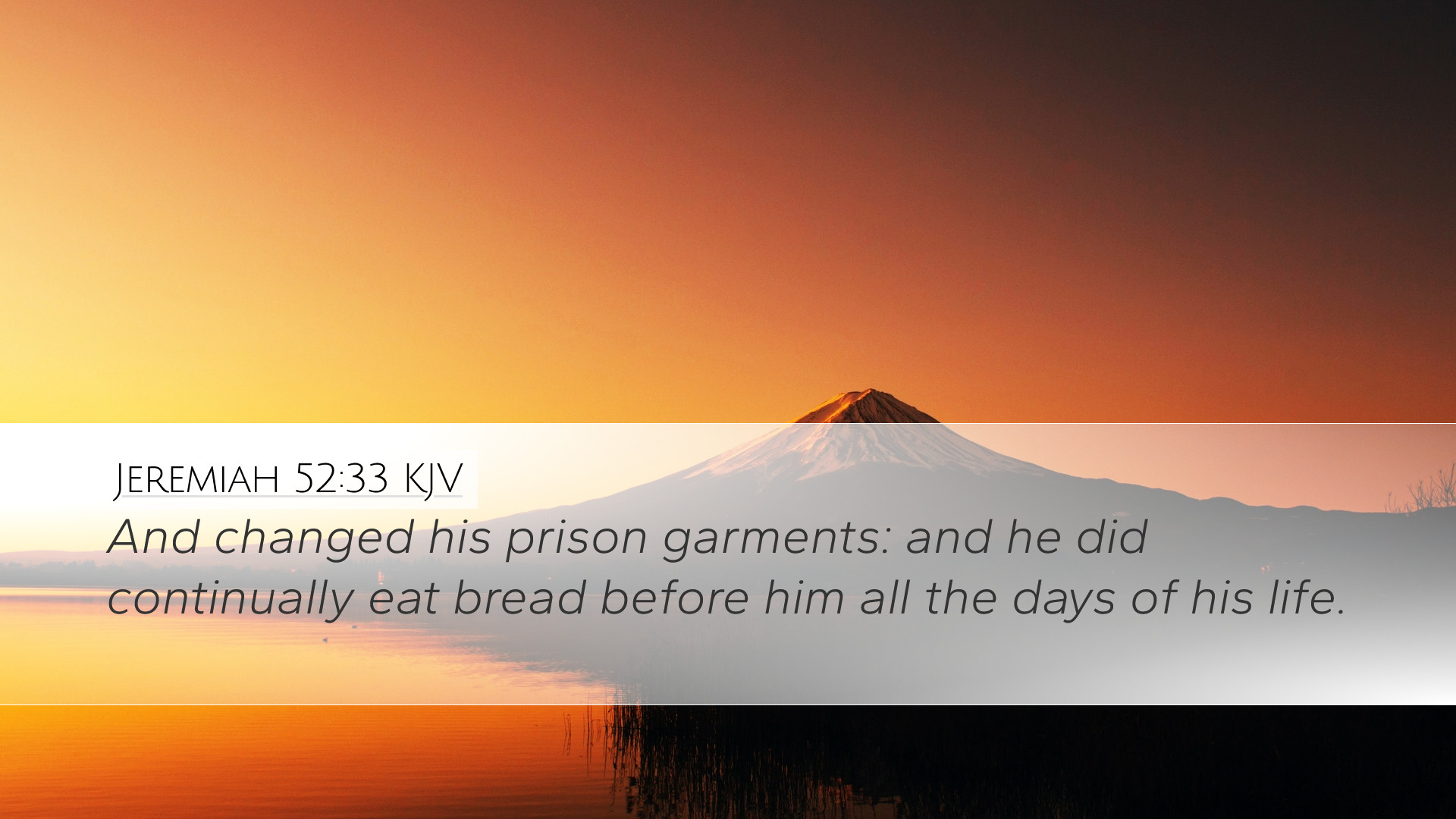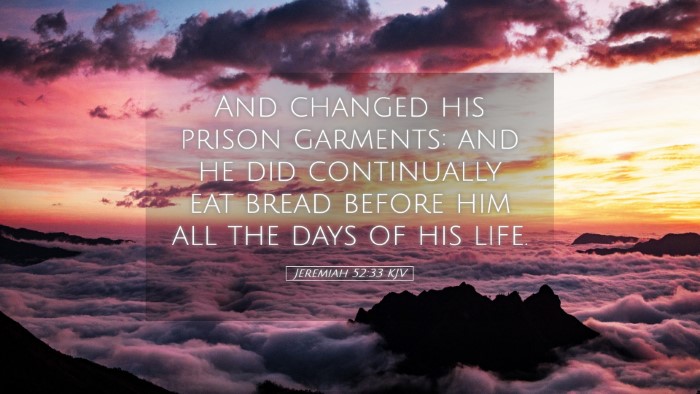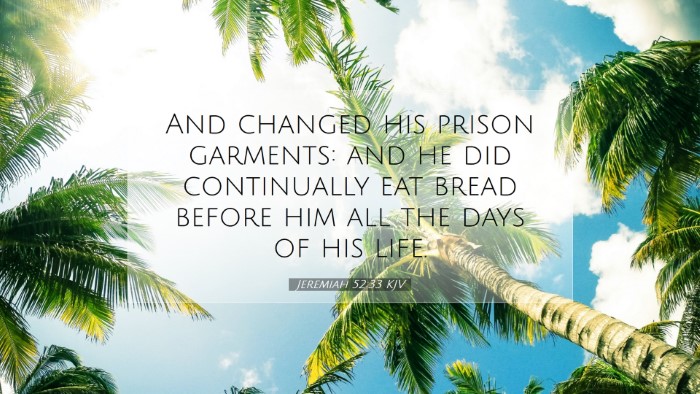Commentary on Jeremiah 52:33
Text of the Verse: "And changed his prison garments: and he did continually eat bread before him all the days of his life."
Introduction
Jeremiah 52:33 concludes the narrative of Jeremiah's imprisonment while highlighting a dramatic shift in the prophet's fortunes following the fall of Jerusalem. This commentary synthesizes insights from several public domain sources to explore the theological, historical, and practical implications of this particular verse.
Contextual Background
The book of Jeremiah contains prophecies and narratives that address the impending doom of Jerusalem due to its idolatry and rebellion against God. The final chapter reflects on the destruction wrought by the Babylonian Empire, which has significant implications for understanding God's judgment and mercy.
Historical Setting
Jeremiah served as a prophet during one of the most tumultuous times in Israel's history, witnessing the siege and destruction of Jerusalem. Much of his life was marked by persecution, imprisonment, and isolation, as he delivered God’s messages to a resistant people.
The Fall of Jerusalem
After the city fell to Nebuchadnezzar, the fate of its leaders and inhabitants varied; it marked the transition of power and a significant fulfillment of prophecy. Jeremiah's role shifts markedly from a prophet of doom to one of hope as he is brought before Nebuchadnezzar.
Commentary Insights
The following points draw from notable commentary perspectives:
Matthew Henry's Commentary
- Transformation of Status: Matthew Henry emphasizes the significant change in Jeremiah's circumstances. From being a prisoner, he is granted a favored status in the king's court, symbolizing God's favor and fulfillment of His promises.
- Provision and Sustenance: The act of eating bread continually reflects the provision and sustenance from God. The mention of 'bread' signifies not only physical nourishment but also spiritual sustenance, linking this moment to God’s ultimate care for His people.
- Continuity of Life: Henry notes that Jeremiah's continuous presence before the king indicates a new beginning for the prophet, shifting from a message of impending doom to a life where he now serves in a more positive capacity.
Albert Barnes' Commentary
- Garment Change Symbolism: Albert Barnes draws attention to the change of prison garments, interpreting it as a sign of new dignity. The removal of old garments symbolizes the end of past suffering and shame, which aligns with the biblical theme of transformation.
- Divine Favor Manifested: Barnes sees this shift as a vivid example of God's grace. Despite Jeremiah's earlier rejection, he is ultimately rewarded, showcasing that God can turn circumstances for His servants' good.
- Lessons on Hope: The implication that Jeremiah dined with the king can serve as a lesson of hope for believers, highlighting how God’s plans may unfold unexpectedly and often lead to an unexpected restoration.
Adam Clarke's Commentary
- Progression of Jeremiah's Journey: Adam Clarke reflects on Jeremiah's long journey from being a prophet of doom to being honored in captivity, suggesting that this shift illustrates the overarching themes of redemption and God's unending faithfulness.
- The Nature of God's Mercy: Clarke also highlights the narrative as a reflection of God's mercy. Jeremiah, despite the dire circumstances of the people, experiences a preservation that underscores God's providence and care for His chosen.
- Sustained Prophetic Voice: Additionally, Clarke posits that Jeremiah remained a prophetic voice throughout his life, even in captivity, which serves as a model for faithful witness in difficult circumstances.
Theological Reflections
This verse encapsulates significant theological themes that are vital for pastors, students, and scholars:
- God's Sovereignty: The transformation of Jeremiah’s status illustrates that God's plans are not derailed by human actions or circumstances. It serves as a reminder of His sovereignty over nations and individual lives.
- Hope in Despair: The hopeful outlook emanating from this verse can inspire believers to maintain hope, reflecting that God can redeem suffering and isolation.
- Resilience of Faith: Jeremiah’s endurance through persecution exemplifies the importance of steadfastness in faith. His life encourages the church to remain firm and hopeful in the face of adversity.
Practical Applications
For practical ministry, this text offers several applications:
- Encouragement for the Hurting: Pastors can remind congregants that even in the lowest points of existence, God is still at work, transforming situations and providing hope.
- Witnessing God’s Provision: This verse serves as a narrative urging believers to recognize and testify of God’s provision in their lives, encouraging a culture of gratitude and faith.
- Steadfastness in Adversity: The message encourages believers to remain faithful witnesses, even when circumstances seem dire, as God is capable of a redemptive turnaround.
Conclusion
The final verse in Jeremiah reinforces profound truths about God’s sovereignty, the importance of hope, and the transformative power of divine providence. These insights, gathered from revered commentaries, provide a robust framework for understanding this pivotal moment in the life of Jeremiah and the broader narrative of God's relationship with His people.


